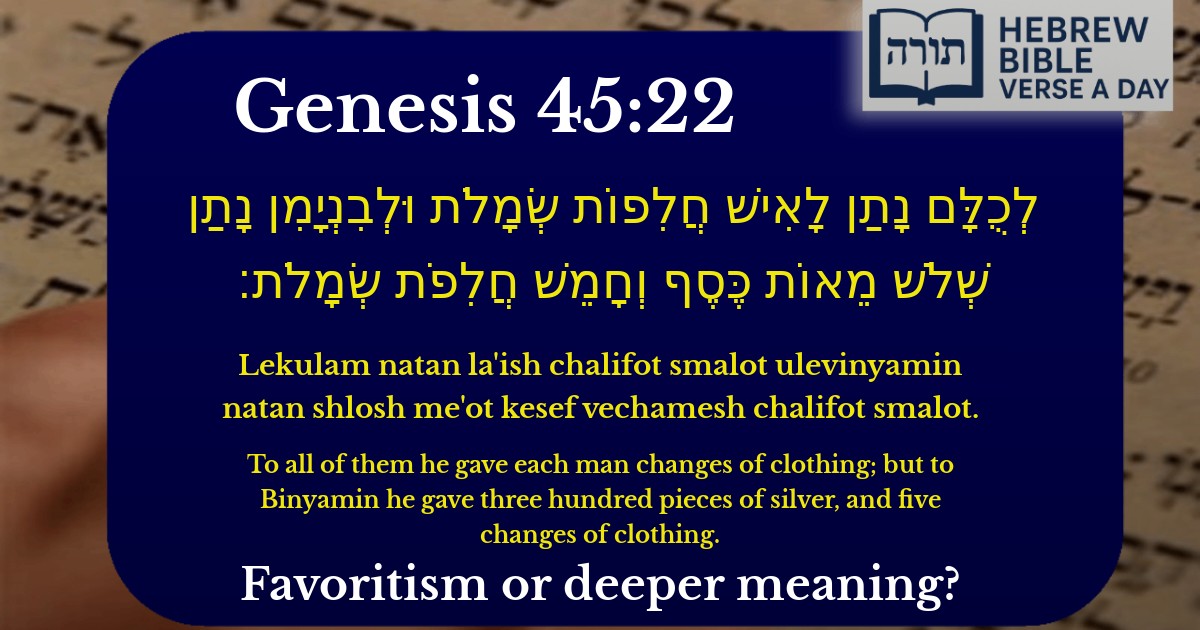Frequently Asked Questions
Q: Why did Yosef give Binyamin more gifts than his other brothers?
A: According to Rashi, Yosef gave Binyamin extra gifts to test his brothers' jealousy, to see if they had truly repented for selling him into slavery. Additionally, the Midrash explains that the five changes of clothing corresponded to the five times Binyamin's descendant Mordechai would be dressed in royal garments in the Purim story (Esther 6:11, 8:15).
Q: What is the significance of giving 'changes of clothing' in this verse?
A: Clothing in Torah often symbolizes status or identity changes. Here, the new garments represented a fresh start for the brothers, removing their past shame. The Ramban notes that fine clothing was also a sign of honor in ancient times, showing Yosef's forgiveness and desire to elevate his brothers.
Q: Why did Yosef give silver specifically to Binyamin?
A: The Talmud (Megillah 16b) connects this to the future when Binyamin's descendant Mordechai would receive silver from Haman's estate (Esther 8:1-2). The 300 silver pieces may also hint to the 300 silver shekels the Philistines later paid Shimshon's wife (Judges 16:5), showing how acts of kindness have long-lasting effects.
Q: How does this verse teach us about sibling relationships?
A: The Vilna Gaon explains that Yosef's generosity demonstrates how to heal family rifts - by showing extra love (to Binyamin) while including everyone (the other brothers). This mirrors how we should prioritize family unity, as the brothers had finally overcome their jealousy to protect Binyamin (Genesis 44:33-34).
Q: What practical lesson can we learn from Yosef's gifts today?
A: The Sforno teaches that Yosef modeled proper gratitude - after achieving greatness, he remembered his family. Today, we learn to: 1) Express appreciation materially (like the gifts), 2) Give according to individual needs (extra for Binyamin), and 3) Use wealth to strengthen family bonds, as Yosef did to reunite Yaakov's household.


Context in the Torah
This verse (Bereishit 45:22) describes Yosef's gifts to his brothers after revealing his identity. The disparity in gifts—particularly the extra silver and garments given to Binyamin—raises questions about Yosef's intentions and the deeper symbolism behind these presents.
Rashi's Explanation
Rashi (Bereishit 45:22) explains that Yosef gave Binyamin five changes of clothing corresponding to the five garments Yosef himself had received in Egypt:
This was a subtle hint that Binyamin, like Yosef, would have descendants who wore special garments: Mordechai, who wore royal apparel (Esther 8:15).
Ibn Ezra's Insight
Ibn Ezra suggests the extra gifts to Binyamin served two purposes:
Midrashic Interpretation
The Midrash (Bereishit Rabbah 94:3) connects the five garments to five future events:
Halachic Perspective
The Rambam (Hilchos Matnos Aniyim 7:3) derives from this verse that when giving gifts, one should consider the individual needs and status of each recipient, as Yosef did by giving Binyamin more according to his particular situation.
Symbolism of the Silver
Kli Yakar explains the 300 silver pieces corresponded to the 300 silver coins the brothers received for selling Yosef (based on the calculation that 20 silver pieces × 10 brothers = 200, plus 100 as interest). This demonstrated Yosef's complete forgiveness - returning the "payment" with interest.